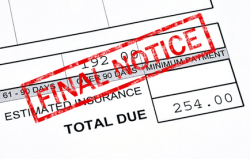 An Oregon man has accused debt collection agency Allied Interstate of violating the federal Fair Debt Collections Practices Act (FDCPA) in its attempts to collect a debt accrued by the man’s son.
An Oregon man has accused debt collection agency Allied Interstate of violating the federal Fair Debt Collections Practices Act (FDCPA) in its attempts to collect a debt accrued by the man’s son.
Plaintiff Chris B. filed a debt collection lawsuit in February 2015 after Minnesota-based Allied Interstate repeated calls to his son regarding a debt to Wells Fargo Bank. The son maintains that the debt was for transactions for personal, family, and household purposes.
According to the Allied Interstate debt collection lawsuit, the bill collector agency began calling Chris’s home telephone in June 2014. Chris answered at least one of the collection calls.
During at least one of the collection calls, the caller did not disclose that it was calling on behalf of Allied Interstate, even after being asked by the plaintiff. The debt collector only made the disclosure after Chris gave the collector an ultimatum that the call would be terminated unless the collector did not identify for whom they were calling.
Upon learning that the calls were over a $1,500 debt incurred by Chris’s son in 2000, according to the debt collection lawsuit, Chris told the collectors to stop calling him. Chris was not a co-signor on the loan, according to the unfair debt collection lawsuit.
The calls ceased temporarily but resumed in November 2014, with debt collection calls every day of the week. Chris answered at least one of the calls and repeated his request from June that the calls stop. But the calls have continued, according to the lawsuit.
“Plaintiff is not a co-signor or otherwise responsible for the debt Defendant is attempting to collect from Plaintiff’s son,” the debt collection lawsuit states. “The natural consequences of Defendant’s statements and actions was to produce an unpleasant and/or hostile situation between Defendant and Plaintiff.”
Chris’s unfair debt collection lawsuit accuses Allied Interstate of numerous violations of the FDCPA, including:
- Failing to identify the defendant as the collector’s employer after expressly requested by the plaintiff
- Disclosing to Chris that his son owed a debt
- Communicating with plaintiff more than once and not reasonably believing that the earlier response of the plaintiff was erroneous or incomplete and that the Plaintiff now had correct or complete location information
- Engaging in conduct intended to harass, oppress, or abuse any person in connection with the collection of a debt when Defendant’s collectors continued to call plaintiff repeatedly for a debt he does not even owe and after being told several times to cease
- Causing a telephone to ring or engaging any person in telephone conversation repeatedly or continuously with intent to annoy, abuse, or harass any person at the called number after being told to cease
- Placing telephone calls to plaintiff without meaningful disclosure of the caller’s identity when Defendant’s collector
- Using any false, deceptive, or misleading representation or means in connection with the collection of any debt
- Using false representation or deceptive means to collect or attempt to collect any debt or to obtain information;
- Using unfair or unconscionable means to collect or attempt to collect any debt when defendant’s collectors continued to harass and badger plaintiff over a debt owed by plaintiff’s son even after repeatedly being told by the plaintiff not to call him.
Federal law prohibits debt collectors from making false statements and engaging in deceptive practices, attempting to collect debts that have expired or are not owed (such as those discharged in bankruptcy or debts previously settled), making improper reports to credit reporting agencies and contacting third parties, such as family members or employers, in an effort to collect the debt.
If a debt collector is found to have violated the FDCPA, the debtor is entitled to receive $1,000 in statutory damages, plus any actual damages that they have suffered.
Join a Free Unfair Debt Collection Class Action Lawsuit Investigation
If a lender or debt collector engaged in unfair debt collection practices, you may have a legal claim and could be owed compensation for violations of the Fair Debt Collection Practices Act (FDCPA).
DISCLAIMER: Debt collection itself is not illegal. However, debt collection firms collecting on consumer debts must adhere to the FDCPA. Even though debt attorneys are investigating these companies, their debt collection practices may be legal.
ATTORNEY ADVERTISING
Top Class Actions is a Proud Member of the American Bar Association
LEGAL INFORMATION IS NOT LEGAL ADVICE
Top Class Actions Legal Statement
©2008 – 2025 Top Class Actions® LLC
Various Trademarks held by their respective owners
This website is not intended for viewing or usage by European Union citizens.














